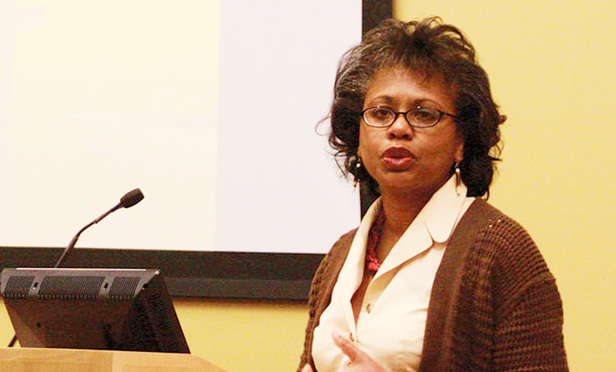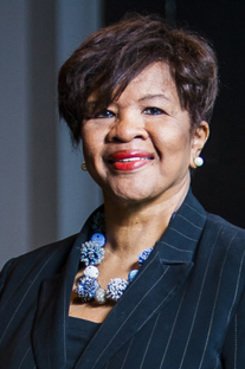Lawyers Who Guided Anita Hill Offer Advice to Kavanaugh's Accuser
"The brutality of the political arena is merciless," says Georgetown Law's Emma Coleman Jordan, who was on the team advising and guiding Anita Hill in 1991 when she testified against Clarence Thomas at his U.S. Supreme Court confirmation hearing. Jordan and a colleague, Susan Deller Ross, offer insight, as Congress prepares for the possibility of the airing of misconduct claims against Supreme Court nominee Brett Kavanaugh.
September 17, 2018 at 06:08 PM
7 minute read
 Anita Hill teaching at Brandeis University. Photo Credit: Alan Tran/The Brandeis Hoot.
Anita Hill teaching at Brandeis University. Photo Credit: Alan Tran/The Brandeis Hoot.
The 27 years since the Clarence Thomas confirmation hearings have not dimmed the memory for two of Anita Hill's lawyers, and they have some lessons—and advice—for the California psychologist who is making a sexual assault allegation against U.S. Supreme Court nominee Brett Kavanaugh.
In 1991, Emma Coleman Jordan had just become the first African-American president of the Association of American Law Schools when news broke that Hill was coming forward with sexual harassment allegations against President George H.W. Bush nominee Thomas. Susan Deller Ross, a nationally recognized civil rights and discrimination expert, was and still is a member of the Georgetown University Law Center faculty, where Jordan also now teaches.
 Emma Coleman Jordan. Photo: Diego M. Radzinschi/ALM
Emma Coleman Jordan. Photo: Diego M. Radzinschi/ALMJordan knew Hill since they had been on a panel together discussing commercial law. She decided, she said, to call Hill, then a professor at the University of Oklahoma Law School. “I asked her if she had legal representation,” Jordan recalled. “She said, 'No,' and my mouth flew open because they were already saying she was going to testify.”
Jordan and others, including Georgetown's Ross, Janet Napolitano and the late John Frank, soon formed a legal team for Hill. Harvard Law School's Charles Ogletree became the “face” of the team throughout the hearings.
Jordan and Ross see some similarities to the events now unfolding with the accusation by Christine Blasey Ford that Kavanaugh sexually assaulted her at a summer party when they were in high school in 1982. Ford was 15 and Kavanaugh would have been 17.
Ford is represented by Debra Katz of Washington's Katz, Marshall & Banks, who said Monday Ford is willing to testify. Kavanaugh has flatly denied any misconduct, insisting “categorically and unequivocally” he did nothing wrong.
What follow are the two women's observations on similarities and differences between the Hill and Ford situations as well as their advice for Ford if she testifies before the Senate Judiciary Committee. The conversations, which were separate, were edited for length and clarity.
What do the Hill and Ford events have in common?
Jordan: Even 27 years later, the Senate Judiciary Committee is caught flat footed. There is no avenue for protected testimony to come forward. They have this confidential process but we know that matters of sexual predation, sexual assault, are long simmering. We know that from the Catholic Church experience; we know that from the Bill Cosby episodes. It takes women a long time to gather the courage to say what their truth is and the courage to go up against a man with power and fortune. The scrambling of the majority response to this information—that part, I think, is the same, sadly. I can say that it's not a matter of political party or even gender.
It's also good to see that the lie detector test approach we used is now being used in this case. That part was important. We got Paul Minor, a retired FBI agent to do the polygraph of Anita. We knew it would be important to support her credibility.
What differences stand out?
Ross: I think this seems different in many ways. In the case of Thomas, there was a lot of corroborating evidence for Hill but [the committee] deliberately kept it out. There doesn't sound like there's much corroborating evidence for Ford, except her own recollections and interaction with her therapist and husband, but this accusation was made well before there was any thought of [Kavanaugh] being named to the Supreme Court.
Jordan: There were other people Anita told at the time and they testified. What I understand of Dr. Ford's, she was a teenager and did not tell anyone. She was afraid to tell her parents because she had had a beer and wasn't supposed to be drinking. The lack of the contemporaneous reports are different, and it's fully understandable but that is a difference.
A major difference is this is an accusation of a violent assault. I don't think anybody thought Clarence Thomas could have been arrested for what he did. Violence wasn't part of the equation. In my mind, this is two or three steps up in significance because it's an accusation of violent assault, an attempted rape.
And the time period between the events and the nomination—a big difference there. This is a much longer time difference—nearly 40 years.
What advice would you give today to Christine Blasey Ford?
Ross: I would think it would be important for her to talk about why it was difficult for her to talk about it, why it took so long to come to grips with it, how did it impact her?
I think her feelings are very important for people to understand. They don't know how it would feel to be 15 years old and have something like that happen to you. I'd want her to talk about that and how her feelings about that have changed over the years. The reason for not telling her parents are obvious but why not girlfriends and her husband when they got married.
Get her therapist to talk about it—did she find Dr. Ford's story believable, and her husband—how did it impact her marriage? It is very personal and she may not want to talk about it. Who knows if the Republicans on the committee will even let her talk about it.
Jordan: I know that one of the most poignant moments in the hearing was when Anita's parents and her family came into the hearing. They were there silently to support her.
One piece of advice is to take care of herself and marshal her support network—family, friends. That will be important for the reality of support but also for the image of support. It's important to communicate she is part of a family, a network, and to find a way to communicate the depth and breadth of support that she has.
I also would advise her to spend time with her sources of positive reinforcement of her identity. It could be her church, her therapist, her family, her husband. That psychological and spiritual identity reinforcement is important when going up against a political machine. The brutality of the political arena is merciless.
She should be careful to identify the core of the facts that she does recall. Don't let anybody push her into saying things that are not verifiable—that's what they'll try to do and use that to say she is lying. What does she remember—the color of the bedroom, the house, the smell, anything she has a vivid memory of. Her personal perception—where was the bathroom she hid in. That's what her lawyer will prep her on. And know when she doesn't remember something and be prepared to say it without embarrassment.
Read more:
Debra Katz: Kavanaugh Accuser Is Willing to Testify About Misconduct Claims
Kavanaugh, Amid Sexual Assault Claim, Reportedly Hires Beth Wilkinson
Brett Kavanaugh's Accuser, Speaking Publicly, Puts New Pressure on Republicans
Brett Kavanaugh Controversy Recalls Past Confirmation Tussles
Liberal Law Prof. Akhil Amar: If Not Brett Kavanaugh, Then Who?
This content has been archived. It is available through our partners, LexisNexis® and Bloomberg Law.
To view this content, please continue to their sites.
Not a Lexis Subscriber?
Subscribe Now
Not a Bloomberg Law Subscriber?
Subscribe Now
NOT FOR REPRINT
© 2025 ALM Global, LLC, All Rights Reserved. Request academic re-use from www.copyright.com. All other uses, submit a request to [email protected]. For more information visit Asset & Logo Licensing.
You Might Like
View All
US Patent Innovators Can Look to International Trade Commission Enforcement for Protection, IP Lawyers Say

Zuckerman Spaeder Gets Ready to Move Offices in DC, Deploy AI Tools in 2025
5 minute read
Outgoing USPTO Director Kathi Vidal: ‘We All Want the Country to Be in a Better Place’
19 minute read
Ex-Deputy AG Trusts U.S. Legal System To Pull Country Through Times of Duress
7 minute readTrending Stories
Who Got The Work
J. Brugh Lower of Gibbons has entered an appearance for industrial equipment supplier Devco Corporation in a pending trademark infringement lawsuit. The suit, accusing the defendant of selling knock-off Graco products, was filed Dec. 18 in New Jersey District Court by Rivkin Radler on behalf of Graco Inc. and Graco Minnesota. The case, assigned to U.S. District Judge Zahid N. Quraishi, is 3:24-cv-11294, Graco Inc. et al v. Devco Corporation.
Who Got The Work
Rebecca Maller-Stein and Kent A. Yalowitz of Arnold & Porter Kaye Scholer have entered their appearances for Hanaco Venture Capital and its executives, Lior Prosor and David Frankel, in a pending securities lawsuit. The action, filed on Dec. 24 in New York Southern District Court by Zell, Aron & Co. on behalf of Goldeneye Advisors, accuses the defendants of negligently and fraudulently managing the plaintiff's $1 million investment. The case, assigned to U.S. District Judge Vernon S. Broderick, is 1:24-cv-09918, Goldeneye Advisors, LLC v. Hanaco Venture Capital, Ltd. et al.
Who Got The Work
Attorneys from A&O Shearman has stepped in as defense counsel for Toronto-Dominion Bank and other defendants in a pending securities class action. The suit, filed Dec. 11 in New York Southern District Court by Bleichmar Fonti & Auld, accuses the defendants of concealing the bank's 'pervasive' deficiencies in regards to its compliance with the Bank Secrecy Act and the quality of its anti-money laundering controls. The case, assigned to U.S. District Judge Arun Subramanian, is 1:24-cv-09445, Gonzalez v. The Toronto-Dominion Bank et al.
Who Got The Work
Crown Castle International, a Pennsylvania company providing shared communications infrastructure, has turned to Luke D. Wolf of Gordon Rees Scully Mansukhani to fend off a pending breach-of-contract lawsuit. The court action, filed Nov. 25 in Michigan Eastern District Court by Hooper Hathaway PC on behalf of The Town Residences LLC, accuses Crown Castle of failing to transfer approximately $30,000 in utility payments from T-Mobile in breach of a roof-top lease and assignment agreement. The case, assigned to U.S. District Judge Susan K. Declercq, is 2:24-cv-13131, The Town Residences LLC v. T-Mobile US, Inc. et al.
Who Got The Work
Wilfred P. Coronato and Daniel M. Schwartz of McCarter & English have stepped in as defense counsel to Electrolux Home Products Inc. in a pending product liability lawsuit. The court action, filed Nov. 26 in New York Eastern District Court by Poulos Lopiccolo PC and Nagel Rice LLP on behalf of David Stern, alleges that the defendant's refrigerators’ drawers and shelving repeatedly break and fall apart within months after purchase. The case, assigned to U.S. District Judge Joan M. Azrack, is 2:24-cv-08204, Stern v. Electrolux Home Products, Inc.
Featured Firms
Law Offices of Gary Martin Hays & Associates, P.C.
(470) 294-1674
Law Offices of Mark E. Salomone
(857) 444-6468
Smith & Hassler
(713) 739-1250










